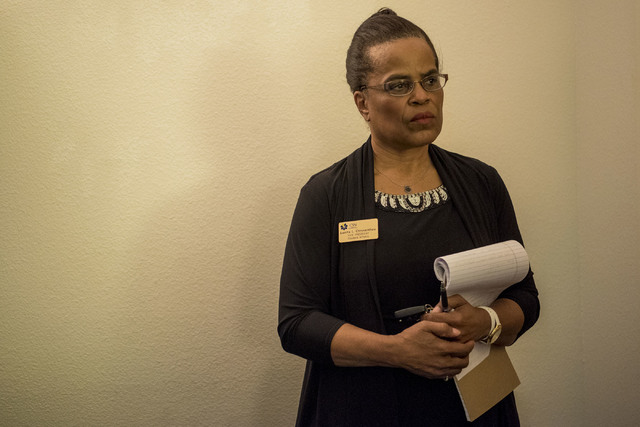College of Southern Nevada finds its mental health program in limbo

The doors to Counseling and Psychological Services at the College of Southern Nevada have not fully closed, but the program is in a state of limbo following the departure of its two clinicians and other staff members.
The office, which served more than 300 students in the 2015-16 academic year, lost its only remaining clinical psychologist, who was employed in a temporary capacity, on Sept. 30. That has since left the college with few options and some faculty members with questions as to how to provide mental health assistance to nearly 35,000 students across three campuses.
“Students are stressed out from working, and family life, and being overwhelmed by school can contribute to a student’s mental health,” said Stephanie Fiorenza, an instructor in the department of physical science. “It’s important for schools to have a solution for students.”
Juanita Chrysanthou, vice president of student affairs, said CSN is committed to rebuilding the program. Part of the process, she said, also involves determining what the appropriate number of psychological counselors should be for a college with such a large enrollment. The salary range for a licensed clinical psychologist at the school is listed at $72,864 to $116,393.
“We’re looking at a way to rebuild the service while continuing to provide services to students,” Chrysanthou said.CSN counseling vid
Victor Schwartz, medical director for the Jed Foundation, whose mission is to protect emotional health and prevent suicide among college and university students, said there are no federal or state guidelines regarding a ratio of mental health professionals to students on a community college campus. However, he said it’s beneficial to student retention and success for a school to provide mental health access on campus.
“There’s real value in having clinicians who really understand the elements of college life,” he said.
Chrysanthou sent an email to staff on Oct. 19, stating that the administration appreciates faculty support as “we work to rebuild CAPS and determine the best long-term strategy to assisting CSN students.”
The email further stated that faculty and staff should continue to direct any students who may need services to the counseling and psychological office, and that administrative oversight is being provided by Dr. Charles Gary, interim associate vice president of student services.
Fiorenza identified one of her students as needing these services, and after learning of the office’s status, she advised the student to consult her health insurance. The student learned that her health plan covered a certain number of counseling sessions, and Fiorenza guided the student in setting up the initial appointment.
Meanwhile, Chrysanthou has made finding a solution her top priority.
“It is so important that for a couple of months that was my top priority — working to ensure that the doors were not closed,” she said. “It’s important to have that continuity that staff and students have come to expect.”
The initial strategy, she said, was to find out whether any community organizations or agencies could help the college meet the immediate need. She even reached out to UNLV, as the university also provides counseling services to Nevada State College students. But she learned they were “at capacity.”
“That tells you something about the availability of people to provide that service,” she said. “One of the things I learned when I arrived here just over a year ago is that the valley has a shortage of mental health practitioners, clinicians. In previously posted vacancies, we didn’t have many responders.”
Upon the most recent departure of the temporary clinical psychologist Sept. 30, remaining office staff maintained a waiting list, which grew to 69 students over the monthlong period, and also referred students who had immediate mental health needs to external providers.
“We have a list of community referrals that we had had for years,” Chrysanthou said. “Some provide no cost, or low cost to students. The office never closed.”
The 69 students on the waiting list represented those who were willing to wait to receive services on campus as well as those who wanted to receive immediate services externally and be added to the list.
As of this week, the college has entered a partnership with University of Nevada, Reno’s Mojave Mental Health Center, which coincidentally has office space on the Charleston campus. Since Wednesday, more than half of the wait-listed students have been contacted, and CSN is working to set up appointments for students with mental health professionals at the center.
The contracted services with Mojave Mental Health represents an estimated 25 percent reduction in cost, as well as the anticipated provision of services at the same level of last year, during which 328 students were seen.
The contract provides a student up to 10 visits, which is the same number previously provided through CSN.
Through the partnership with Mojave Mental Health, Chrysanthou said the availability for students to meet with counselors has increased, as the center is making multiple clinicians available.
“We have actually expanded service and opportunity,” she said. “We’re doing the best we can.”
Contact Natalie Bruzda at nbruzda@reviewjournal.com or 702-477-3897. Follow @NatalieBruzda on Twitter.